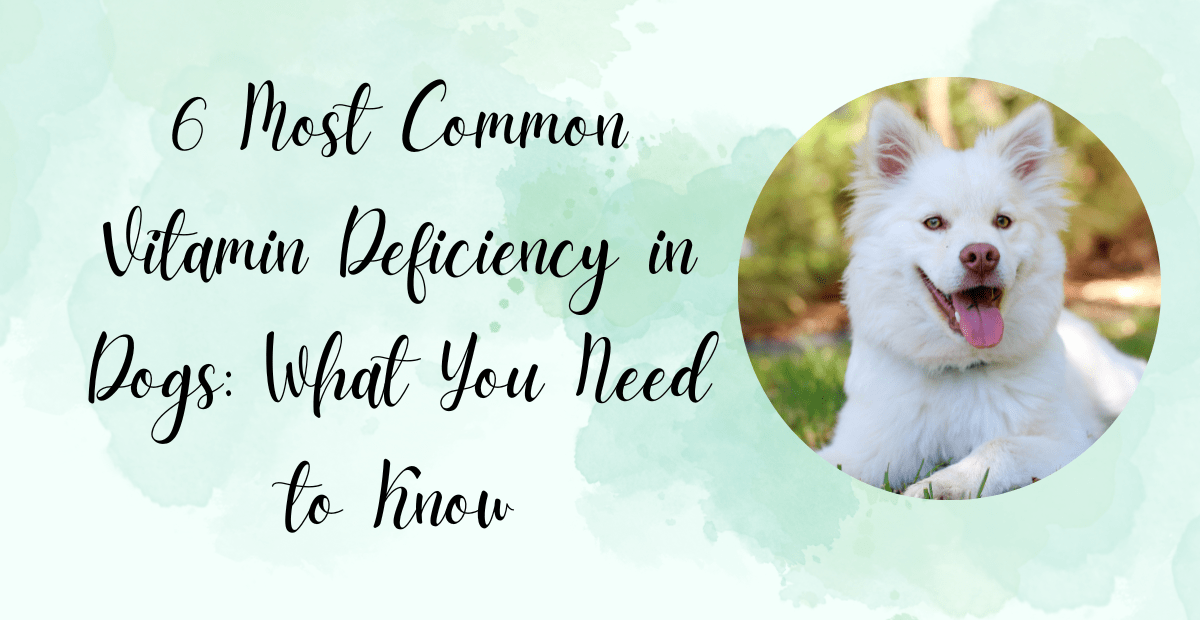Last updated on January 26th, 2024 at 06:03 am
The most common vitamin deficiency in dogs is very typically seen in your pets.
Vitamins are also essential for maintaining the best possible health for your dog. Like humans, dogs need vitamins and minerals, and when they don’t get them, they might develop a variety of disorders related to vitamin deficiencies.
Generally, vitamin deficiency is not seen in animals because most food like animal or plant-based diet rich in vitamins. When nutrition absorption in the body has been hampered, it can sometimes cause a dog’s underlying health issue. A bad, insufficient, or unbalanced diet can also cause a dog to be vitamin deficient.
In this, we discussed the most common vitamin deficiency that arises in dogs, their symptoms, and treatment.
Primary causes of vitamin deficiency in dogs
1. Unbalanced homemade food
Most dog owners choose to feed their dogs a home-cooked diet or raw meat. Vitamin deficiencies can develop if some meals do not have enough vitamins or do not include any vitamins at all.
2. Low quality Packed or Canned Dog Food
When given low-quality, nutritionally-deficient pre-packaged commercial dog food, dogs may exhibit symptoms that are related to vitamin deficiency.

3. Parasitic infestation
If dogs are affected by parasites like ringworms and tapeworms, they scavenge resources from dogs’ diets and bodily functions to sustain themselves. So in this case dogs are not getting proper nutrition to maintain their bodily function even if they are in a proper diet also.
4. No regular monitoring of daily food intake
Dog owners must always be aware of the foods they are giving their dogs, as well as how much and when they eat them. If dogs eat an insufficient quantity of food then, they did not get proper nutrition.
5. Unhealthy dog
When a dog has serious health issues, it may not be able to adequately absorb nutrients, which increases the risk of vitamin deficiencies.
Therefore, a lack of nutrients such as vitamins can cause a variety of illnesses and disorders in dogs. This section (Table 1) covers the most prevalent vitamin deficiencies that affect dogs, their symptoms, and possible treatments.
Table 1: 6 most common vitamin deficiencies in dogs
| Sl. No. | Name of deficiency | Cause | Symptoms | Treatments |
| 1. | Beta carotene deficiency | Lack of Vitamin A | -Frequently unwell (poor immune system) -Prone to itching and rashes (dry, irritated skin) -Night blindness (this is occasionally a genetic feature) -Weight loss | Vitamin A-rich food Animal based food -Liver, -Liver oil -Egg yolks Plant based food -Kale -Sweet potatoes -Carrots -Pumpkins |
| 2. | Vitamin D deficiency | Lack of Vitamin D2/ Vitamin D3 | -Major cardiac issues – Rickets illness, – Weak bones -Joint inflammation -Bone abnormalities – Lethargy – Muscle loss – Stunted growth in puppies and young dogs | Vitamin D-rich food Animal-based food -Liver -Liver oil -Egg yolks -Marine fish oil -Dairy product –Cottage cheese |
| 3. | Vitamin E deficiency | Lack of Vitamin E | -Muscle deterioration – May affect reproductive health -Cell damage | –Nuts and fatty oils are excellent sources of this vitamin · Eg-peanut butter -soybean oil – sunflower oil –Leafy green vegetables –Grains– wheat germ -whole grain -oats |
| 4. | Thiamine deficiency | Lack of Vitamin B1 | -Nausea, -Drooling – Appetite loss | –Meat -Fish -Whole grain |
| 5. | Riboflavin deficiency | Lack of Vitamin B2 | -Weakness, -Weight loss, -Dry, flaky skin, -Eye lesions and sores, -Stunted growth | –Leafy vegetables -Nutritious cereals -Yoghurt with living cultures (sugar free) |
| 6. | Niacin deficiency | Lack of Vitamin B3 | – Convulsions, -Bloody diarrhoea -Bleeding gums and lips -Loss of appetite –Pellagra, often known as black tongue | Animal based diet- -Liver meat -Poultry breast -Tuna fish -Ground beef Vegetable-based diet- -Mushroom -Green pea -Potato |
Read More: The Important Fact About Cheese Feeding in Dogs
So, a deficiency of any vitamins in the diet of your furry may hamper health condition of them. The diet that has been supplied to your dogs, whether it has been homemade or may have come from commercial pet foods, should be adequately enriched with micronutrients like vitamins, minerals, and other vital elements as well.
FAQ
Which vitamin deficiency affects dogs the most frequently?
Vitamin D deficiency is the most prevalent vitamin deficit in dogs. Around 70% of all dogs tested for deficiency in vitamin D showed deficiency, which is a significant percentage and frequently chronic.
Do dogs have a vitamin B12 deficiency or not?
The signs of a B12 deficiency can be difficult to identify. The most typical sign is weight loss, which is easily confused with other health-related problems. It includes decreased appetite, diarrhoea, exhaustion, mental dullness, and neurological problems.
What is a good source of vitamin B12?
Organ meat, as well as several other foods including eggs, yoghurt, goat milk, and fresh, raw, or lightly cooked muscle meat, can provide plenty of vitamin B12 for your dog. Seaweed is the ideal option if you want to incorporate more plants into your pet’s diet.
What are the most common symptoms of vitamin C deficiency in dogs seen?
After 8 to 12 weeks of inadequate intake, vitamin C deficiency becomes symptomatic and displays irritability and anorexia seen in dogs. Dermatological findings after these first symptoms include delayed wound healing, gingival swelling with tooth loss, ecchymosis, mucocutaneous petechiae, and hyperkeratosis.




